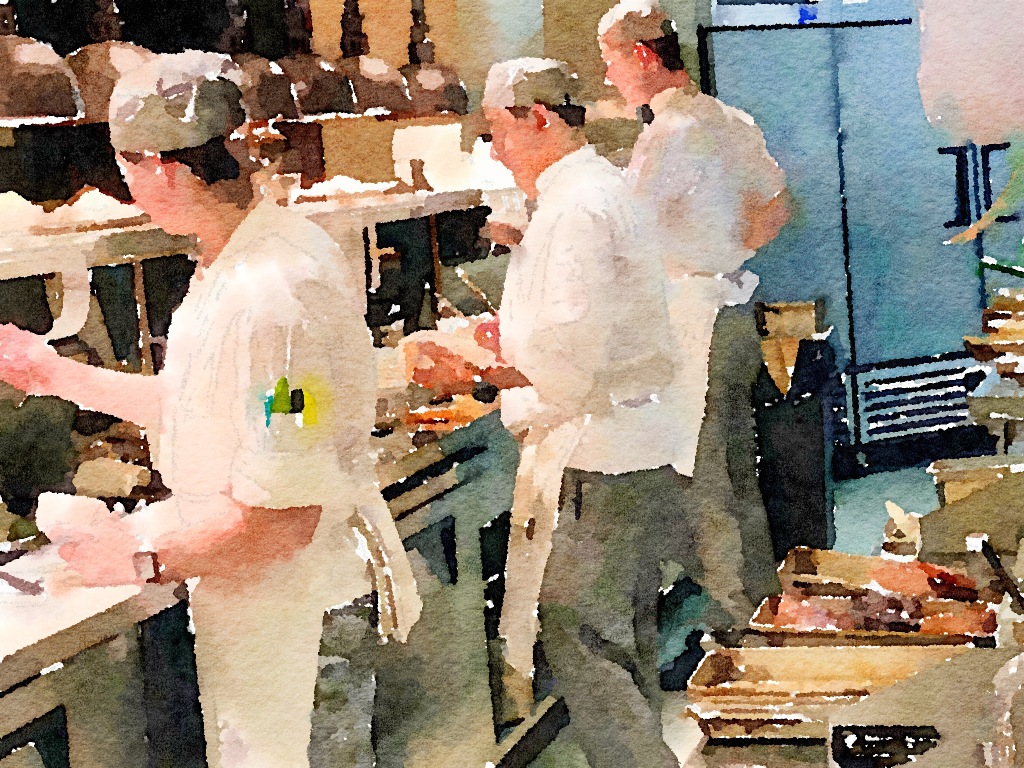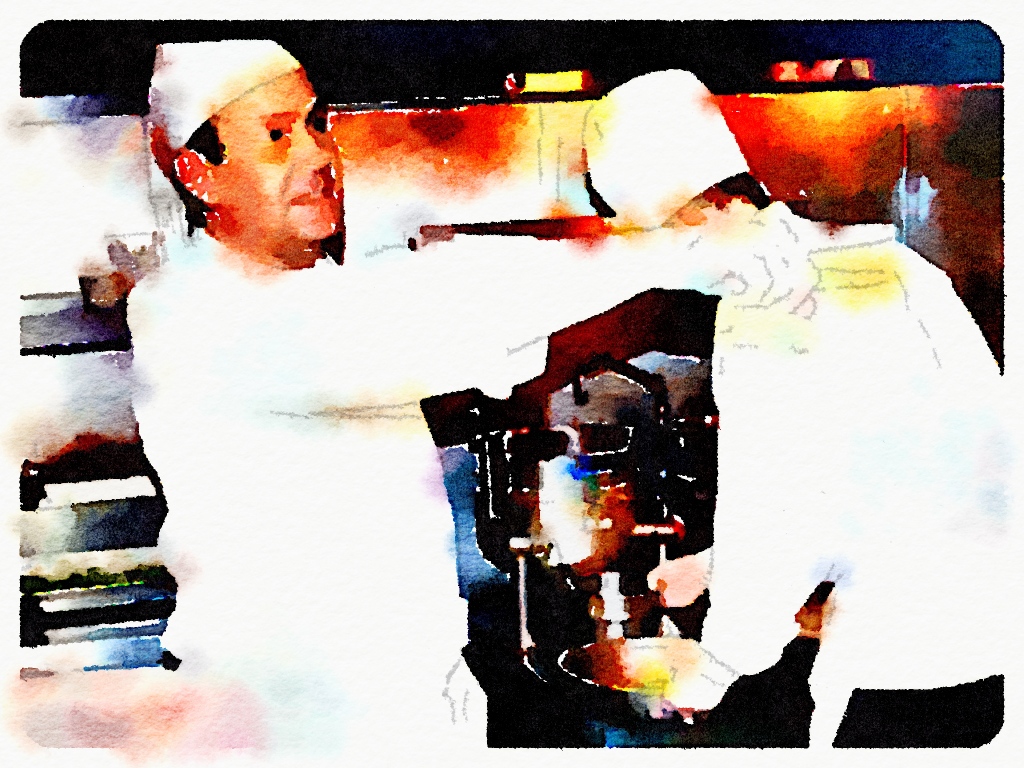
The kitchen sensual army
There are many things that differentiate cooks and chefs, but none more important to the customer experience and the reputation of the restaurant than mastery of the senses. Whether a fine-dining experience or your local taqueria – the cooks that stand out, the ones that are the reason why customers line up to buy their food, are the ones with well developed senses of taste, smell, touch, sight, and sound as they relate to what takes place in the kitchen.
The essential tool in development of these senses is experience. Certain individuals may be born with the capacity to taste and smell, with the innate talent to present beautiful food, and with excellent hearing, but it is what those senses are exposed to that makes a cook – a great cook. Every experience that we have is imbedded in our subconscious mind. When we are exposed to that memory again, it moves quickly to the conscious realm and we say: “a’ha – I remember that”. After frequent exposure to that same memory can even allow an experienced cook or chef to envision what that product will smell, look, sound, and taste like – even before that takes place. This is how experienced chefs are able to plan dishes and menus knowing how ingredients will marry together, what the overall flavor profile will be, and how the final dish will look. It’s an amazing process.
Without the experience associated with the development of this sensual tool, it is like a beautiful knife that never leaves the roll bag, or fine china that never serves as a canvas for a plate of food. Thus, the best cooks and chefs are always seeking out those sensual food experiences so that they can develop their flavor memory.
It is common for people to confuse flavor and taste as being the same, but taste is but a portion of the flavor experience. Flavor is a combination of taste, sight, sound, smell, and texture – all in the right proportions. Try tasting a familiar ingredient while you hold your nose to see how the flavor changes. Close your eyes and taste a raw potato next to a fresh apple and see how similar they are. Think about it: Is a potato chip a potato chip without the sound of the crunch? Is fresh baked apple pie as appealing if it has no smell? Why do green and white asparagus taste so different – does it have anything to do with the color?
An interesting exercise to establish the importance of sense experiences is to ask your cooks some basic questions:
[] WHAT DOES A STRAWBERRY TASTE LIKE?
The majority of time the cook will likely say something like: “It tastes like a strawberry”. Well, if that cook had never tasted a fresh picked, fully mature strawberry before – how would they know what to expect? More importantly, how would they know how to differentiate a great strawberry from an inferior one?
[] DESCRIBE THE FLAVOR OF BAR-B-QUE BRISKET?
Anyone from a southern state will likely win any contest in describing this flavor, and ironically, their response will differ depending on which state they are from. What will be universal are the smokiness, the moisture, the tenderness, and the subsequent mouth feel that comes from a process that goes beyond taste. Unless you have tried a brisket that was smoked and cooked over coals for 12-24 hours then it will be impossible to describe the flavor or know when a properly cooked brisket is just right.
[] WHAT DOES A FRESH TRUFFLE SMELL LIKE?
The truffle is one of the most unique, impossible to describe ingredients unless you have held one up to your nose, shaved it offer soft scrambled eggs or fresh pasta, or buried it in raw Arborio rice to imbed its perfume in a dish of risotto. It is intoxicating and overwhelming to the senses. But without the experiences mentioned, it would be impossible to describe.
[] TELL ME IF THE HOLLANDAISE I JUST PREPARED IS CORRECT?
What is the balance of lemon and heat from Tabasco? What is the right amount of salt? Is the correct balance of egg yolk and clarified butter present? Is the mouth feel correct? A sauce with the simplest of ingredients is so hard to make correctly and to achieve proper balance. Can you imagine being asked to make a hollandaise if you never made one correctly before or had never tasted a perfect example?
[] CAN YOU TELL IF A SAUTE DIVER SCALLOP IS BEING COOKED CORRECTLY IF YOU ARE BLINDFOLDED AND 20 FEET AWAY FROM THE RANGE?
That scallop will only reach it’s perfect state if the pan used to sear it is screaming hot and the portion of clarified butter is just right. The sound of a pan when it sizzles beneath that scallop and the smell of butter before it passes the burn point is a tell- all even if the cook does not see the scallop.
[] ARE YOU ABLE TO DETERMINE THE DEGREE OF DONENESS ON THAT STEAK BY SIMPLY TOUCHING IT?
Of course a cook can always probe that steak with a thermometer to determine degrees of doneness, but a seasoned broiler cook would never be caught doing that. This cook knows the give of the muscle at medium or medium rare. He or she knows the perfect point at which to give the steak a 45 degree turn to imprint those beautiful grill marks, when to flip the steak (just once), and when to pull it from the heat so that it takes advantage of carry over cooking and time to rest so that it doesn’t bleed out when that first cut of the knife opens it up on a plate.
[] CAN YOU TELL IF THOSE ONIONS ARE CARAMELIZING PROPERLY JUST BY SMELLING THEM FROM THE OPPOSITE END OF THE KITCHEN?
The Maillard reaction (reducing sugars and protein through the application of heat) that is the process of caramelization has its own smell and sound. If it is taken too far then the item begins to burn giving off a less than pleasant aroma. When it is done right the sound of the sizzle and the sweet smell of this chemical reaction is one of the most positive of kitchen aromas.

When the chef turns on his sensual radar
A seasoned chef can walk through a kitchen, turn on his or her sensual radar and assess what is going right and what is going wrong. When the radar is tuned in, he sights, smells, sounds, and tastes of the kitchen fill the air and send signals of process and outcome. These are skills that go way beyond a person’s natural ability; it is a culmination of experiences that have changed how the cook views the world around him or her. Without these experiences, this capacity will never be realized.
Cooks who have the desire to master their craft are the ones who seek out food experiences, taste and mentally record those experiences, re-introduce those experiences frequently enough to allow them to become a part of their bag of tricks, and relish the opportunity to share this gift with others. When this happens they are in control of the food that is being prepared, the ingredients that are being purchased, and the success of the team engaged in creating memories for restaurant guests.
PLAN BETTER – TRAIN HARDER
Experience is the best educator
Restaurant Consulting
Harvest America Ventures, LLC
www.harvestamericacues.com BLOG
CAFÉ Talks podcast

Leave a comment